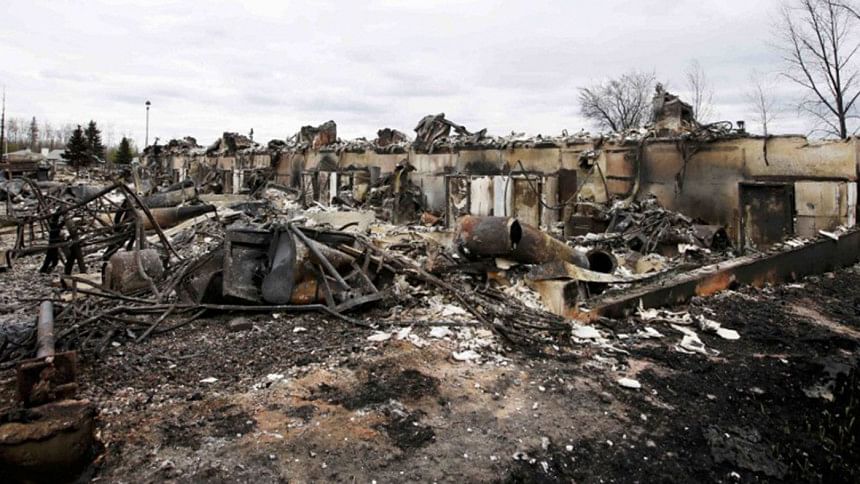Canada fires: Alberta oil firms to restart production

Oil sands firms in Canada's Alberta province are slowly restarting production after a massive wildfire forced a week-long shut down.
Shell Canada and Suncor said they had resumed oil production but at a limited rate.
Though most of the oil plants were not threatened by the fire, many oil workers were forced to flee as the city of Fort McMurray was evacuated.
Wildfires continue to devastate swathes of Canadian forest.
Fires are growing in Manitoba province, to the east of Alberta, on the border with Ontario.
The neighbouring US state of Minnesota has sent its firefighting planes to help the Manitoba authorities protect homes and a railway line in the Caddy Lake area.
Meanwhile, the New York Times reports scientists as warning for years of the threat to the huge boreal forest which encircles the Northern Hemisphere in a band near and just below the Arctic Circle, through Alaska, Canada, Scandinavia and Russia.
They say rising temperatures, drying trees and earlier melting of snow have contributed to a growing number of wildfires, burning through what makes up nearly a third of the forest land on the planet.
The fire that devastated Fort McMurray is continuing to burn and has merged with another fire further east, growing to some 229,000 hectares (560,000 acres), but it is moving into areas with no communities.
Alberta Premier Rachel Notley met oil sands executives yesterday and said they expected to have production back online in a matter of "days and short weeks".
"While thousands of lives will never be the same, we can take small steps to getting back the rhythm of north-east Alberta," she said.
"For many in Fort McMurray, that means rolling up the sleeves, and returning to work doing what they love, which is working in the energy sector."
Suncor chief executive Steve Williams, the head of Canada's largest oil company, said some plants could be up and running within 24-28 hours, while others could take a week or two.
"The most difficult are the ones we haven't been to yet which will be down south of Fort McMurray where the fire actually went across the plants,'' he said.
He said they were confident of being able to ensure staff could be moved easily to and from the oil plants, and there was plenty of housing available on site.
Earlier yesterday, Notley toured Fort McMurray and found that 90% of the buildings had survived the blaze.
More than 80,000 people were evacuated from the city last week. Nobody was killed in the fire but two people died in a car crash when they were leaving the city.
Officials say they hope to provide a schedule within two weeks for the return of residents.
Prime Minister Justin Trudeau will visit Fort McMurray on Friday. He said he would be going to "offer up support for all Canadians".

 For all latest news, follow The Daily Star's Google News channel.
For all latest news, follow The Daily Star's Google News channel. 








Comments